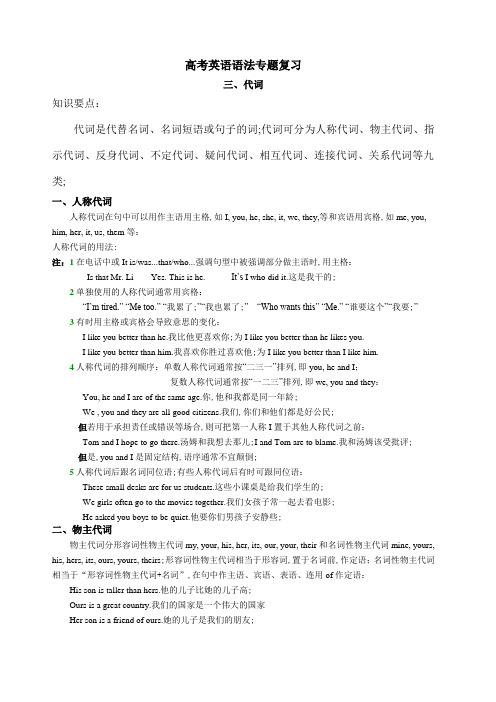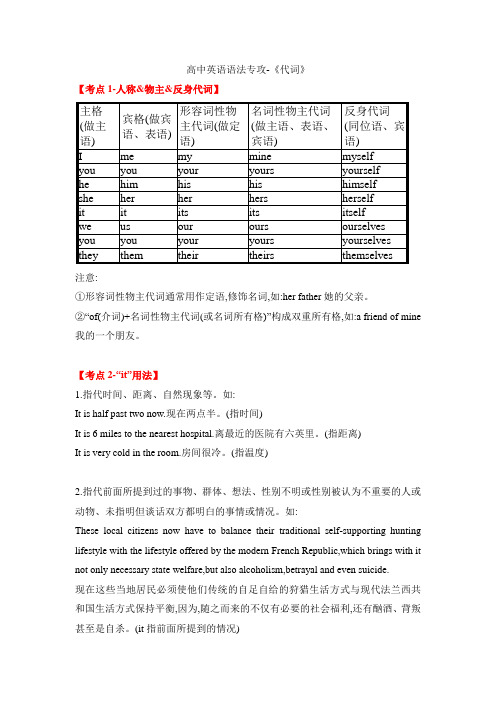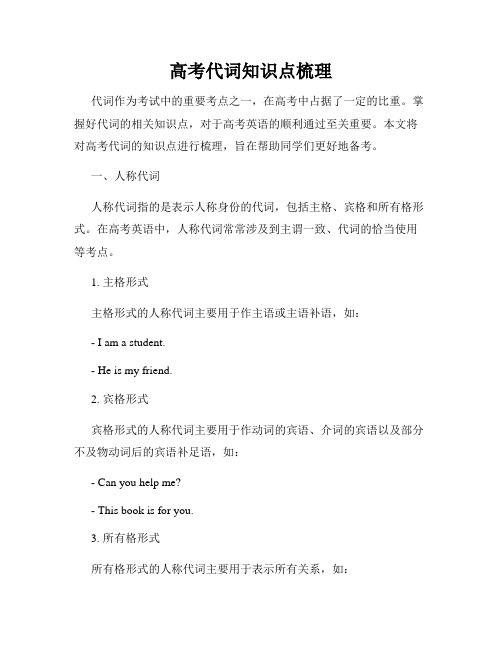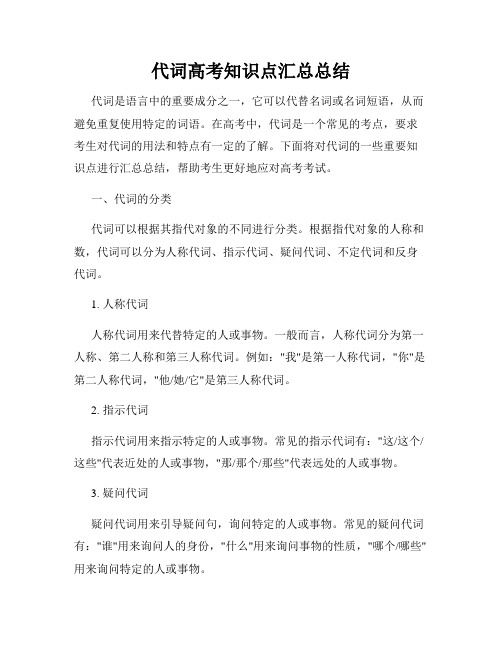高考代词考点
高考英语语法专题复习代词

高考英语语法专题复习三、代词知识要点:代词是代替名词、名词短语或句子的词;代词可分为人称代词、物主代词、指示代词、反身代词、不定代词、疑问代词、相互代词、连接代词、关系代词等九类;一、人称代词人称代词在句中可以用作主语用主格,如I, you, he, she, it, we, they,等和宾语用宾格,如me, you, him, her, it, us, them等:人称代词的用法:注:1在电话中或It is/was...that/who...强调句型中被强调部分做主语时,用主格:---Is that Mr. Li ---Yes. This is he. It’s I who did it.这是我干的;2单独使用的人称代词通常用宾格:“I’m tired.” “Me too.” “我累了;”“我也累了;”“Who wants this” “Me.” “谁要这个”“我要;”3有时用主格或宾格会导致意思的变化:I like you better than he.我比他更喜欢你;为I like you better than he likes you.I like you better than him.我喜欢你胜过喜欢他;为I like you better than I like him.4人称代词的排列顺序:单数人称代词通常按“二三一”排列,即you, he and I;复数人称代词通常按“一二三”排列,即we, you and they:You, he and I are of the same age.你,他和我都是同一年龄;We , you and they are all good citizens.我们,你们和他们都是好公民;但若用于承担责任或错误等场合,则可把第一人称I置于其他人称代词之前:Tom and I hope to go there.汤姆和我想去那儿;I and Tom are to blame.我和汤姆该受批评;但是,you and I是固定结构,语序通常不宜颠倒;5人称代词后跟名词同位语;有些人称代词后有时可跟同位语:These small desks are for us students.这些小课桌是给我们学生的;We girls often go to the movies together.我们女孩子常一起去看电影;He asked you boys to be quiet.他要你们男孩子安静些;二、物主代词物主代词分形容词性物主代词my, your, his, her, its, our, your, their和名词性物主代词mine, yours, his, hers, its, ours, yours, theirs;形容词性物主代词相当于形容词,置于名词前,作定语;名词性物主代词相当于“形容词性物主代词+名词”,在句中作主语、宾语、表语、连用of作定语:His son is taller than hers.他的儿子比她的儿子高;Ours is a great country.我们的国家是一个伟大的国家Her son is a friend of ours.她的儿子是我们的朋友;This is your pen. Mine is in the box.这是你的铅笔,我的在铅笔盒里;注:1 a friend of mine ours, yours, hers, his, theirs结构2 物主代词与own连用;表强调;也可用of one’s own置于名词后作定语:Mind your own business.别管闲事;I saw it with my own eyes.那是我亲眼看到的;I hope to have a room of my own. / I hope to have my own house.我希望有自己的房子;三、指示代词指示代词是用来指代或标记人或事物的代词,表示“这个,这些”“那个,那些”;在句中可作主语、宾语、表语、定语;单数:this, that;复数:these, those;为了方便学习将such,so也归于此类;I like these and he likes those.我喜欢这些,他喜欢那些;What I want to say is this.我想说的就是这点;注:1 指示代词用作主语和定语时,可指人或物;用作宾语和表语时,只指物;如:This is my father. 作主语,指人Do you know this作宾语,指物,译为“你知道这个情况吗2 刚提到的或已经完成的事情时用that,但是若要指下文将要发生或将要提到的事情通常用this:She married Jim, and that surprised me.她嫁给了吉姆,这使我感到很吃惊;I want to know this: Is he healthy我想知道这一点:他是否很健康;3 在打电话时,通常用this指自己,用that指对方:Hello. This is Jim. Is that John喂,我是吉姆,你是约翰吗4 such指代前面所述的这样的人或事;如:Such is Albert Einstein, a famous physicist, but a simple man. 这就是艾尔伯特,爱因斯坦,......5 so代替一个句子或短语表达的事情;a.在believe,expect,suppose,imagine,think等词后用so代替前文观点;表肯定、否定=not均可;b. 用于表示肯定的hope,I’m afraid后,代替前文提出的观点;四、反身代词反身代词是oneself根据所指词的人称、性别、单复数等变化的词单数:myself, yourself,himself, herself, itself, 复数:ourselves, yourselves, themselves,在句中可作宾语、表语、同位语,不能作主语; 注:1用作同位语加强被修饰词的语气,紧放在被修饰名词后,或句末:The box itself is not so heavy.箱子本身并不重;You yourself said so. / You said so yourself.你自己是这样说的;2用作宾语动词或for,of, in, by, to等介词的宾语:She could not make herself understood.她不能使别人听懂她的话;You’ll have to see if he has come for yourself. for one self 亲自,为自己The computer may shut off of itself. of oneself 自动的You shouldn’t leave the child at home by herself. b y oneself 独自,单独Jim isn’t bad in himself, but he likes playing tricks on others. in one self 本身He likes a table to himself. to oneself 独自占用3 用作表语:有时用于be, feel, seem, look等后作表语表示身体或精神处于正常状态:The poor boy was myself.那个可怜的孩子就是我自己;The ones who really want it are ourselves.真正想要它的是我们自己;I'm not quite myself these days.我近来身体不大舒服;I'll be myself again in no time.我过一会儿就会好的;4 含有反身代词的动词短语:devote oneself to=be devoted to 专心于;lose oneself=be lost in 迷失;seat oneself= be seated 坐下; express oneself 表达某人的思想; say for oneself 为自己找借口;say to oneself 心想; talkto oneself 自言自语; feel oneself 觉得正常; come to oneself 苏醒;五、疑问代词疑问代词包括who, whom, whose,which, what,在句中可用作主语、表语、宾语、定语等:1、who与whom的用法:前者为主格,用作主语、宾语,后者为宾格,用作宾语;Who spoke at the meeting Whom are you talking about口语中或作宾语的whom位于句首时,通常可用who代替,但whom前有介词时除外:Whom is the letter from2、whose的用法:表示“谁的”,既可用于名词前作定语,也可单独使用;在句中作主、宾、表、定语;Whose is better, yours or hers作主语Whose do you love better, yours or hers作宾语Tom has already taken his bag is this作表语Whose bag do you like作定语3、what和which的用法:有选择范围时,多用which;无选择范围或不明确时,多用what;拓展:what的习惯用法:1 What...for... 和What for 用于询问原因和目的;---What did you put it into the soup for --- It would improve the taste.你为什么...---I’m going to the grocery store. ---What for We still have enough food in the apartment.为何啊(2)What if...表示假设、建议、征求意见或疑虑;What if it rains while we are on the way(3)What do you mean by...表示愤怒、不满等情绪;What do you mean by shutting the door so loudly(4)What/How about...用于征求对方意见、询问对方的情况;(5)疑问词what构成的固定搭配;So what那又怎么样呢表示不感兴趣或认为不重要What next店员用语还要什么Guess what你猜怎么着用于引起他人的注意What can I do for you你要买借什么4、what和who的区别:一般来说;what问职业、地位等,who问姓名或关系等:Who is he他是谁What is he他是干什么的六、相互代词相互代词只有each other和one another,它们在句中通常只用作宾语:We should help each other.我们应该互相帮助;They respect one another.他们互相尊重对方;The sea and the sky seem to melt into each other.大海和蓝天似乎融为一体;注:1相互代词在句中通常只用作宾语,不可作主语,所以以相互代词为宾语的句子不能变为被动语态;2不要将相互代词误认为是副词,将其用作状语,如可说talk to each other,但不能说talk each other;3相互代词可以有所有格形式:The students borrowed each other's notes.学生们互相借笔记;4有时可分开用:We each know what the other thinks.我们都知道对方的想法;七、不定代词1.不定代词概说;英语的不定代词有all, each, both, either, neither, one, none, little, few, many, much, other, another, some, any, no,few,little, both, enough, every等,以及由some, any, no和every构成的合成代词即somebody, anyone, nothing等;在这些不定代词中,多数都能作主语、宾语、表语或定语,但是代词none以及由some, any, no和every构成的合成代词只能作主语、宾语或表语,不能作定语,而no和every则只用作定语;2.指两者和三者的不定代词;有些不定代词用于指两者如both, either, neither,有的不定代词用于指三者如all, any, none, every,注意不要弄混:Both of my parents are doctors.我的父母都是医生;All of the students are interested in it.所有的学生对此都很感兴趣;There are trees on any side of the square.广场的每一边都种有树;He has two sons, neither of whom is rich.他有两个儿子,都不富有;He has three sons, none of whom is rich.他有三个儿子,都不富有;注:each可用于两者、三者或三者以上,而every只用于三者或三者以上,因此用于两者时只能用each,不能用every;如不能说There are trees on every side of the road.3.复合不定代词的用法特点;复合不定代词包括something, somebody, someone, anything, anybody, anyone, nothing, nobody, no one, everything, everybody, everyone等;它们在句中可用作主语、宾语或表语,但不能用作定语;something, someone等和anything, anyone等的区别与some和any的区别一样,前者一般用于肯定句,后者一般用于否定句、疑问句或条件句参见any & some;具体使用时应注意以下几点:1复合不定代词受定语修饰时,定语应放在它们后面:There is nothing wrong with the radio.这收音机没有毛病;Have you seen anyone anybody famous你见过名人吗2指人的复合不定代词若用作主语,其谓语动词一般用单数,相应的人称代词和物主代词也用单数he, him, his 不一定指男性;但在非正式文体中常用复数代词they, them, their:Everyone knows this, doesn't he don't they人人都知道这一点,不是吗If anybody anyone comes, ask him them to wait.要是有人来,让他等着;3指事物的复合不定代词若用作主语,谓语动词只能用单数,相应的人称代词也只能用it,而不用they:Everything is ready, isn't it一切都准备好了,是吗4anyone, everyone等只能指人,不能指物,且其后一般不接of短语;若是指物或后接of短语,可用any one, every one 分开写:any one of the boys books孩子们书当中的任何一个本every one of the students schools每一个学生一所学校4.是any not还是not any;按英语习惯,any以及含有any的复合不定代词用于否定句时,它只能出现在否定词之后,而不能在否定词之前:误:Any one doesn't know how to do it.正:No one knows how to do it.任何人都不知道如何做它;误:Anybody Anyone cannot do it.正:Nobody No one can do it.这事谁也干不了;误:Anything cannot prevent me from going.正:Nothing can prevent me from going.什么也不能阻挡我去;5.不定代词与部分否定;不定代词all, both, every等与not连用时构成部分否定;若要表示完全否定,则需换用none, neither, no one等;比较:All of the students like the novel.所有这些学生都喜欢这本小说;Not all of the students like the novel.并不是所有这些学生都喜欢这本小说;All of the students don’t like the novel.并不是所有这些学生都喜欢这本小说;None of the students like the novel.这些学生当中没有一个喜欢这本小说;6.all, both, each等用作同位语;若用作主语同位语,主语可以是名词或代词;若用作宾语等其他成分的同位语,则宾语等成分必须是人称代词,而不能是名词:We have all read it.我们都读过他;all修饰的主语是代词The villages have all been destroyed.村庄都被毁了;all修饰的主语是名词They told us all to wait there.他叫我们都在那儿等;all修饰的宾语是代词但不能说:They told the men all to wait there. all修饰的宾语是名词不是代词7.so little与such little的区别;用so little还是such little取决于little的意思:若表示数量方面的“少”,则用so little;若表示形状体积的“小”,则用such little:He has so little time for reading.他读书的时间少得可怜;I've never seen such little boxes.我从未见过那样小的盒子;8.some与any的用法区别;一般说来,some用于肯定句中,any用于否定句和疑问句中;但是,在表示请求、邀请或征求意见的句子中,通常要用some而不用any:Would you like some cake吃点蛋糕吗Why not buy some bread为什么不买些面包呢Shall I get some chalk for you要我帮你拿些粉笔来吗注:any有时也用于肯定句中,此时表示“任何”:Any colour will do.任何颜色都行;Come any day you like.随便哪天来都可以;9.many与much的用法区别;两者都表示“许多”,但many修饰或代替可数名词复数,与few少数相对;而much用来修饰或代替不可数名词单数,与little少量相对;在口语中两者主要用于非肯定句中:Did you see many people there你在那儿看见许多人了吗We don't have much time.我们没有许多时间;在肯定句中,一般用a lot of, lots of, plenty of等代之;但在正式文体中有时也用于肯定句中;另外,若用作主语或主语的定语,或其前有how, too, as, so, a good, a great等修饰,也可用于肯定句中:Many of us left early.我们有许多人离开得很早;Much work has been done.许多工作都已经做了;You've given me too much.你已给我太多了;Take as many much as you want.你要多少拿多少;I asked her a great many questions.我问了她许多问题;10.few, a few与little, a little的用法区别;1few和a few后接可数名词的复数形式;few表示数量很少或几乎没有,强调“少”,含有否定意义;a few表示数量虽然少但毕竟还有,强调“有”,含有肯定意义:It is very difficult, and few people understand it.它很难,没有几个人能懂;It is very difficult, but a few people understand it.他虽难,但是有些人懂;2little和a little之后接不可数名词,其区别跟few和a few之间的区别相似:Unfortunately, I had little money on me.很不巧,我身上没带什么钱;Fortunately, I had a little money on me.幸好我身上带着一点钱;11.other, the other, another与others的用法区别:这些不定代词不仅在含义上有单复数之分,而且在用法上有泛指无the和特指有the之别;其用法区别可归纳如下:1指单数时,若泛指用another,若特指用the other:Give me another one.另外给我一个;Shut the other eye, please.请把另一只眼睛也闭上;2指复数时,若泛指用other后接复数名词,若特指用the other后接复数名词:There are other ways of doing it.做这事还有其他的办法;Where have the other students gone其他学生都到哪里去了3others永远表示复数意义且其后不能再接名词;其用法大致相当于“other+复数名词”,同样地the others大致相当于“the other+复数名词”:Other people Others may not think that way.别的人可能不这样想;He is cleverer than the others the other students in her class.他比班上其他学生聪明;4another一般只能表单数,且其后接名词也只能接单数名词;但是若其后有数词或few修饰时,则也可接复数名词:We need another few chairs.我们还需要几把椅子;In another two weeks it'll be finished.再过两个星期就可做完了;5与some对比使用时,用others此时与some同义:Some say yes, and others say no.有人说对,有人说不对;12.不定代词与语境考题;不定代词是高考的常考考点,有的不定代词考题出得比较灵活,不能死套规则,要注意结合语境来理解:1“Is ____ here” “No, Bob and Tim have asked for leave.”A. anybodyB. everybodyC. somebodyD. nobody若只是从表面来看,填空句是个疑问句,可能会误选A;但其实此题最佳答案应选B,因为下文的答句说“只有Bob和Tim请假了”,这说明问句是在查人数,故用Is everybody here 大家都到齐了吗2I agree with most of what you said, but I don't agree with _____.A. everythingB. anythingC. somethingD. nothing此句若从表面看,有可能误选B,因为填空句为否定句;但实际上最佳答案为A,因为上文说“我同意他说的大部分内容”,这与下文的but I don’t agree with everything但并不是同意他说的所有内容完全相符;3“Do you have _____ at home now, Mary” “No, we still have to get some fruit and tea.”A. somethingB. anythingC. everythingD. nothing答案选C,句意为“玛丽,现在家里东西都准备齐了吗”“还没有,我们还要买些水果和茶;”4“If you want a necklace, I’ll buy one for you at once.” “Oh, no. A necklace is not _____ that I need most. A. anythingB. somethingC. nothingD. everything此题容易误选A,机械地认为:something用于肯定句,anything用于否定句或疑问句;但是,此题的最佳答案是B,something在此的意思不是“某种东西”,而是指“那种东西”或“这种东西”,即心中最想要的那种东西相当于the thing;。
高考英语代词在英语单项选择中的8个考点

高考英语代词在单项填空中的8个热点考点1 人称代词宾格活用下列情况也用宾格:①在be后作表语。
—Who is it? —It’s me.②在单独使用或带not的简略回答中。
如:—Who broke the cup? —Me! (Not me!)③在感叹疑问句中做主语,以引起强调。
如:—Y ou can tell him. —你可以告诉他。
—Me tell him? Not likely!④当前面有形容词修饰:--He’s got to repay the money —poor him.考点2指示代词的用法指示词有this, that, these, those等。
注意以下4点:(1) this, these是时间或空间上的“近指”,that, those是时间或空间上的“远指”,(2) 指上文提到的事一般用that,有时也用this,指下文的事只能用this。
(3) 打电话时,用this来介绍自己,用that来问对方,不用I或you。
(4) this和that还可表示程度,意为“如此,那么”,相当于so,作状语。
考点3 表示两者和多者的不定代词的比较1. 表示两者“都”用both,表示两者“都不”用neither; not…. either,表示两者中的“任一”用either。
Not both….部分否定“并非两个都”;2. 表示多者“都”用all,表示多者“都不”用none,not … any表示多者中的“任一”用any。
not all…部分否定“并非所有都….”;3. none可指人或物,一般要接表示范围的of短语,可回答how many;而no one 只指人。
不能接of短语,可回答who考点4 some, any的用法辨析表示“一些”,一般说来,肯定句中some,否定句中用any;但在表示请求、建议、劝请或希望对方作肯定回答的疑问句中用some。
另外,any 有时也用于肯定句中,表示“任何”。
高考英语语法专攻-《代词》-考点归纳+针对性练习

高中英语语法专攻-《代词》【考点1-人称&物主&反身代词】注意:①形容词性物主代词通常用作定语,修饰名词,如:her father她的父亲。
②“of(介词)+名词性物主代词(或名词所有格)”构成双重所有格,如:a friend of mine 我的一个朋友。
【考点2-“it”用法】1.指代时间、距离、自然现象等。
如:It is half past two now.现在两点半。
(指时间)It is 6 miles to the nearest hospital.离最近的医院有六英里。
(指距离)It is very cold in the room.房间很冷。
(指温度)2.指代前面所提到过的事物、群体、想法、性别不明或性别被认为不重要的人或动物、未指明但谈话双方都明白的事情或情况。
如:These local citizens now have to balance their traditional self-supporting hunting lifestyle with the lifestyle offered by the modern French Republic,which brings with it not only necessary state welfare,but also alcoholism,betrayal and even suicide.现在这些当地居民必须使他们传统的自足自给的狩猎生活方式与现代法兰西共和国生活方式保持平衡,因为,随之而来的不仅有必要的社会福利,还有酗酒、背叛甚至是自杀。
(it指前面所提到的情况)—Who’s that at the door?—It is the milkman.——门口那人是谁?——是送奶工。
(it指代性别不明或性别被认为不重要的人)—I’ve broken a plate.我打碎了一个盘子。
—It(=Breaking the plate) doesn’t matter.没关系。
高考英语代词知识点总结

高考英语代词知识点总结在高考英语中,代词是一个非常重要的语法知识点。
代词在句子中可以替代名词,起到简化句子结构、避免重复的作用。
本文将从不同角度总结高考英语中的代词知识点。
一、人称代词人称代词是用来代替人的名词的词语。
在高考英语中,常见的人称代词有I、you、he、she、we、they等。
在使用人称代词时需要注意其主格和宾格的区别。
主格用于做主语或表语,而宾格则用于做动词或介词的宾语。
例如:I am a student. (主格)She is taller than me. (宾格)除了区分主格和宾格之外,人称代词还有复数形式。
例如:we代表“我们”,they代表“他们”。
二、物主代词物主代词用来表示所属关系,包括形容词性物主代词和名词性物主代词。
形容词性物主代词位于名词前面修饰名词,而名词性物主代词则作为名词的替代词使用。
例如:This is my book. (形容词性物主代词)The red one is mine. (名词性物主代词)在使用物主代词时,需要根据名词的单复数和所有格进行变化。
例如,单数名词后加's,复数名词只加'。
三、反身代词反身代词用来指示动作的承受者与动作的发出者是同一个人。
常见的反身代词有myself、yourself、himself、herself、ourselves、themselves等。
例如:He hurt himself while playing football. (他在踢足球时受伤了)另外,反身代词可以用来强调主语:I myself will finish the task. (我自己会完成这个任务)四、指示代词指示代词用来指示人或物的位置、距离和数量等信息。
常用的指示代词有this、that、these、those等。
例如:This is my bag. (这是我的包)Those are my friends. (那些是我的朋友)指示代词还可以与名词连用来修饰名词,表示特指。
高考代词知识点梳理

高考代词知识点梳理代词作为考试中的重要考点之一,在高考中占据了一定的比重。
掌握好代词的相关知识点,对于高考英语的顺利通过至关重要。
本文将对高考代词的知识点进行梳理,旨在帮助同学们更好地备考。
一、人称代词人称代词指的是表示人称身份的代词,包括主格、宾格和所有格形式。
在高考英语中,人称代词常常涉及到主谓一致、代词的恰当使用等考点。
1. 主格形式主格形式的人称代词主要用于作主语或主语补语,如:- I am a student.- He is my friend.2. 宾格形式宾格形式的人称代词主要用于作动词的宾语、介词的宾语以及部分不及物动词后的宾语补足语,如:- Can you help me?- This book is for you.3. 所有格形式所有格形式的人称代词主要用于表示所有关系,如:- This is my book.- Is that your pencil?二、指示代词指示代词用于指示特定的人或物,包括近指示代词和远指示代词。
在高考中,指示代词常涉及到考生对句子结构的理解和翻译能力。
1. 近指示代词近指示代词主要用于指示距离说话者较近的人或物,如:- This is my bag.- These are my friends.2. 远指示代词远指示代词主要用于指示距离说话者较远的人或物,如:- That is his car.- Those are their houses.三、相互代词相互代词主要用于表示两个或多个人或物之间的相互关系,常见的相互代词有each other和one another。
在高考中,相互代词常常涉及到对人际关系的描述和理解。
1. each othereach other用于表示两个人之间的相互关系,如:- They love each other.- The twins look exactly like each other.2. one anotherone another用于表示两个或多个人之间的相互关系,如:- The team members often help one another.- The students learn from one another.四、不定代词不定代词用于代替不具体指称的人或物,常常涉及到复数、单数、可数、不可数等概念的区分。
高考英语知识点代词归纳

高考英语知识点代词归纳高考英语知识点代词● one泛指一个人或物?其复数形式为ones one和the one作同位语时,如果与其同位的词语是特指,则用the one;如果是泛指,则用one,● that指代前面提到过的名词,常有后置定语 that的复数形式是those that可指代单数可数名词(= the one), 也可指代不可数名词,或指代前面提到过的一件事● it可指代前面提到过的一个名词,如例7;指代一件事,如例8;指代不明性别的婴儿或不明确的人,也可指代时间?天气?距离等0二、考查all, both, either, neither, none, no one的用法[考点解读]● both表示"两个人或物都",具有肯定含义; either表示"两者中的任何一个",如例13; neither表示"两者都不"高考英语必考重点句型句型1would rather that somebody did…"宁愿……;更愿意……"(表示现在或将来的愿望)would rather that somebody had done…"宁愿……;更愿意……"(表示过去的愿望)[例句]I'd rather you posted the letter right now. 我想让你现在去寄信。
I'd rather you were not a celebrated actor. In that case, we could spend more time together.我到情愿你不是个知名演员,这样我们可以有更多的时间在一起。
I'd rather that I hadn't seen her yesterday. 我情愿昨天没有看到她。
句型2as if/though+主语+did/had done…好像……(表示现在或将来的情况用过去时;表示过去的情况用过去完成时)[参考句型4][例句]Our head teacher treats us as if we were her own children, so all the students in our class think highly of her.Alan talked about Rome as if he had been there. Alan谈起罗马来就好像他去过那里似的。
高考英语语法代词考点归纳

高考英语语法代词考点归纳在高考英语中,几乎每一年都会有对英语代词的直接考题,有的出现在单项填空,有的出现在完形填空或短文改错中。
下面由店铺为你提供的高考英语语法代词考点归纳,希望能帮到你。
高考英语语法代词考点归纳一I. 代词可以分为以下八大类1人称代词主格I, you, he, she, it, we, you, they宾格me, you, him, her, it, us, you, them形容词性物主代词my, your, his, her, its, our, their名词性物主代词mine, yours, his, hers, its, ours, theirs 2反身代词myself,yourself,himself,herself,itself,ourselves, yourselves, themselves3指示代词this, that, these, those, such, some4疑问代词who, whom, whose, which, what, whoever,whichever, whatever5关系代词/连接代词that, which, who, whom, whose,as6不定代词one/ some/ any,each/ every,none/ no,many/ much, few/ little/ a few/ a littleother/ another, all/ both, neither/ either7相互代词each other,one another高考英语语法代词考点归纳二II. 不定代词用法注意点类别区别例句one, some,any和it one可以泛指人或者事(东西),其复数为ones ①We’ve been looking at the houses but haven’t found ___ we like yet.A.oneB.onesC.itD.them②Cars do cause us some health problems — in fact far moreserious _______ than mobile phones do.A.oneB.onesC.itD.thosesome可用于疑问句中,表示盼望得到肯定的答复,或者表示建议,请求等—Your coffee smells great! —It’s from Mexico.Would you like ________?A.itB.someC.thisD.1ittlesome 和any修饰可数名词单数时,some表示某个,any表示任何一个①I have read this article in some magazin e. Please correct the mistakes, if any.②—Which of the three ways shall I take to the village?—________way as you please.A.EachB.EveryC.AnyD.Eitherone指同类中的一个,it指代同一种类的东西。
代词高考知识点汇总总结

代词高考知识点汇总总结代词是语言中的重要成分之一,它可以代替名词或名词短语,从而避免重复使用特定的词语。
在高考中,代词是一个常见的考点,要求考生对代词的用法和特点有一定的了解。
下面将对代词的一些重要知识点进行汇总总结,帮助考生更好地应对高考考试。
一、代词的分类代词可以根据其指代对象的不同进行分类。
根据指代对象的人称和数,代词可以分为人称代词、指示代词、疑问代词、不定代词和反身代词。
1. 人称代词人称代词用来代替特定的人或事物。
一般而言,人称代词分为第一人称、第二人称和第三人称代词。
例如:"我"是第一人称代词,"你"是第二人称代词,"他/她/它"是第三人称代词。
2. 指示代词指示代词用来指示特定的人或事物。
常见的指示代词有:"这/这个/这些"代表近处的人或事物,"那/那个/那些"代表远处的人或事物。
3. 疑问代词疑问代词用来引导疑问句,询问特定的人或事物。
常见的疑问代词有:"谁"用来询问人的身份,"什么"用来询问事物的性质,"哪个/哪些"用来询问特定的人或事物。
4. 不定代词不定代词用来指代不确定或不特定的人或事物。
常见的不定代词有:"一些"代表数量不确定的人或事物,"任何"代表无论哪个人或事物,"一切"代表所有的人或事物。
5. 反身代词反身代词用来指示动作的主语和受事者是同一个人或事物。
常见的反身代词有:"自己"用来引起主语指向自己,"互相"用来表示相互之间。
二、代词的用法代词在句子中有不同的用法,可以作为主语、宾语、表语、定语和状语等。
1. 主语和宾语代词可以作为句子的主语或宾语出现。
例如:"他是我的朋友"中,"他"作为主语;"我喜欢她"中,"她"作为宾语。
- 1、下载文档前请自行甄别文档内容的完整性,平台不提供额外的编辑、内容补充、找答案等附加服务。
- 2、"仅部分预览"的文档,不可在线预览部分如存在完整性等问题,可反馈申请退款(可完整预览的文档不适用该条件!)。
- 3、如文档侵犯您的权益,请联系客服反馈,我们会尽快为您处理(人工客服工作时间:9:00-18:30)。
高考代词考点:
1. I like _______ in the autumn when the weather is clear and bright.
A. this
B. that
C. it
D. one
2. —Do you like ______ here?
—Oh, yes. The air, the weather, the way of life. Everything is so nice.
A. this
B. these
C. that
D. it
3. That' s an unpleasant thing to say about your father after______ he' s done for you.
A. something
B. anything
C. all
D. that
4.We needed a new cupboard for the kitchen. So Peter made _____ from some wood we had.
A. it
B. one
C. himself
D. another
5. I had to buy _________ these books because I didn’t know which one was the best.
A. both
B. none
C. neither
D. all
6. I will never know what was on his mind at the time, nor will________.
A. anyone
B. anyone else
C. no one
D. no one else
7. We had three sets of garden tools and we seemed to have no use for ______.
A. none
B. either
C. any
D. each
8.—Which of the three ways shall I take to the village?
—_________ way as you please.
A.Each B.Every C.Any D.Either
9. I invited Joe and Linda to dinner, but ______ of them came.
A. neither
B. either
C. none
D. both
10. There’s _____ cooking oil left in the house. Would you go to the corner sto re and get _____?
A. little; some
B. little; any
C. a little; some
D. a little; any
11.I have done much of the work . Could you please finish in two days ?
A.the rest B.the other C.another D.the others
12. It is easy to do the repair , you need is a hammer and some nails .
A. Something
B. All
C. Both
D. Everything
13. She doesn’t know anyone here. She has got ______to talk to.
A. anyone
B. someone
C. everyone
D. no one
14. Sometimes it was a bit borin g to work there because there wasn’t always ______ much to do.
A. such
B. that
C. more
D. very
15. I intended to compare notes with a friend, but unfortunately couldn’t spare me even one
minute. A. they B. one C. who D. it
16.—One week’s t ime has been wasted.
—I can’t believe we did all that work for .
A. something
B. nothing
C. everything
D. anything
17. Playing tricks on others is we should never do.
A. anything
B. something
C. everything
D. nothing 18.——Look at that woman on the stage. She is already fifty.
------You are joking. She doesn’t look_____.
A. so
B. it
C. that
D. the one
KEYS:1-18 CDCBD BCCAA ABDDA BBB。
